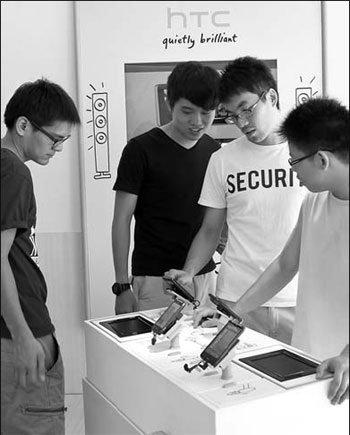|

Customers try out HTC Corp products in Taipei. Apple Inc still has one other patent case against HTC. Maurice Tsai / Bloomberg
|
WASHINGTON - Apple Inc won a patent-infringement ruling that bans some HTC Corp smartphones from the United States starting next year, bolstering efforts to prove that devices running Google Inc's Android operating system copy the Apple iPhone.
The US International Trade Commission, in a review of a judge's findings in July, said on Monday that HTC is violating one Apple patent related to data-detection technology and issued a limited import exclusion order that takes effect April 19.
"HTC will completely remove it from all of our phones soon," Grace Lei, general counsel for HTC, said in an e-mail.
The six-member commission determined that three other patents in the case weren't infringed.
While less than what Apple sought, the ruling gives the company its first victory in patent cases designed to slow the growth of Android, which Steve Jobs claimed "ripped off the iPhone". Apple has one other case against HTC, as well as complaints against Samsung Electronics Co and Motorola Mobility Holdings Inc, and is involved in more than a dozen other cases before the trade commission.
"The battle between Apple and Android is going to continue," said Peter Toren, a patent lawyer with Shulman Rogers. "I'm not sure this decision - the way it is - is enough to push the parties to settlement. Apple doesn't have the leverage of a total exclusionary order."
The list of affected products and a full reason for the commission's decision, which is subject to appeal and a presidential review, wasn't immediately made public. Apple's original complaint named HTC's Nexus One, Touch Pro, Diamond, Tilt II, Dream, myTouch, Hero and Droid Eris.
Kristin Huguet, a spokeswoman for Apple, declined to discuss the possibility of a settlement. She repeated the company's position that "competition is healthy, but competitors should create their own original technology".
Representatives from Google had no immediate comment.
The ruling is the first definitive decision in the dozens of patent cases that began to proliferate in 2010 as smartphone makers battle over a market that Strategy Analytics Inc said increased 44 percent last quarter from a year earlier to 117 million phones worldwide.
HTC, the second-largest maker of Android phones, used its partnership with Google to help transform itself from a contract manufacturer founded in 1997 to the biggest US smartphone seller in the third quarter.
HTC generated about $5 billion in US sales last year, according to a separate patent complaint it filed at the trade agency against Apple. That's more than half of HTC's $9 billion in global sales last year.
The commission's order applies to new phone imports and doesn't force HTC to pull existing devices off US store shelves.
HTC phones accounted for 24 percent of the US smartphone market in the third quarter based on shipments, the research company Canalys reported on Oct 31.
Samsung held 21 percent of the market and Apple 20 percent. The market is volatile, and the Apple iPhone 4s that went on sale in October and Samsung's newest Galaxy phone are likely to change the rankings for the fourth quarter.
Apple contended in its complaint that the HTC phones infringed four patents. Administrative Law Judge Carl Charneski in July sided with Apple for two of the patents: the data-detection one and the other covering the transmission of multiple types of data. The commission overturned the judge's findings on that patent and affirmed his determination that the remaining two patents weren't infringed.
Bloomberg News
(China Daily 12/21/2011 page16)

